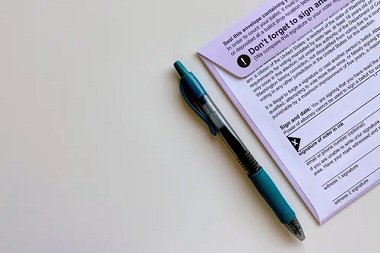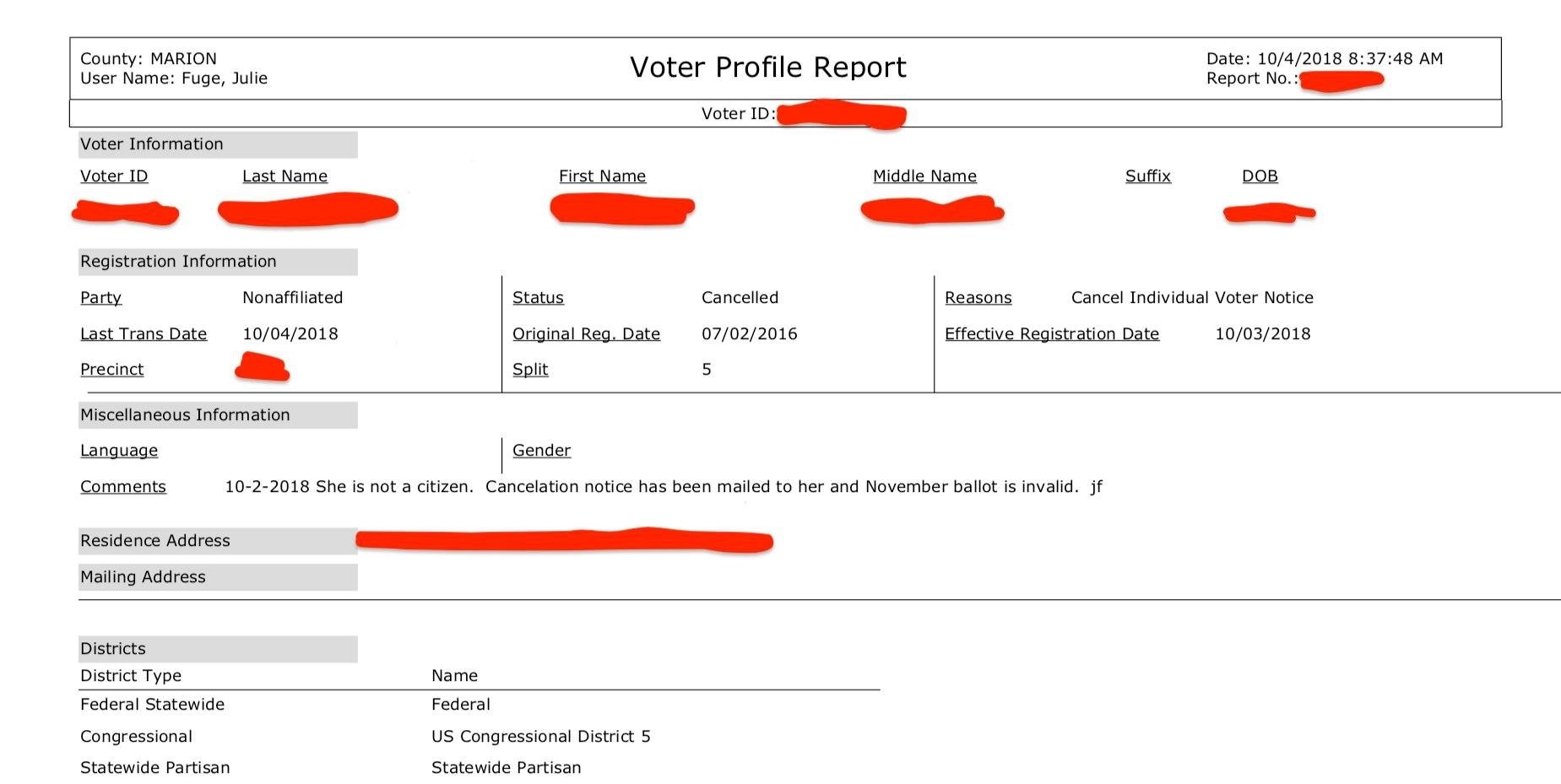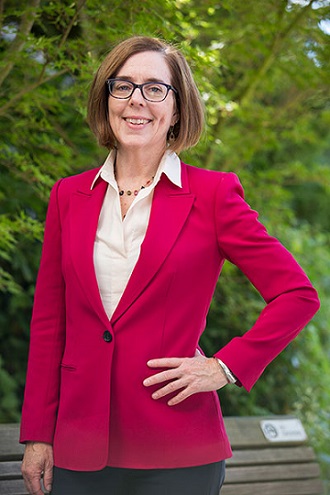The electioneering laws don’t prevent people from showing up at your home
 Editor’s note: this is the first of a multi-part series on Oregon’s mail-in ballots.
Editor’s note: this is the first of a multi-part series on Oregon’s mail-in ballots.
In 1990, Congress passed the Americans with Disabilities Act (ADA) recognizing that people with disabilities had been precluded from fully participating in all aspects of society including voting. Oregon instituted Disability Voting Right using a tablet or computer which allows for assistance.
Janice Dysinger, Oregonians for Fair Elections, says that “anyone’s citizenship status or residence status is difficult to verify because they may not be directly filled out by the voter. Some have language barriers requiring interpreters if specific language documents aren’t available, and the position is that it isn’t the agency’s job to find out if they are qualified. By signing the registration form they certify to it being true.†If needing assistance to register, it begs the question of needing assistance to vote.
When Kate Brown was Secretary of State, the Mark and Dave radio show on KEX asked the audience who completes the ballots in your house. People were calling in and laughing about it. A high school kid marked his dad's ballot, had the dad sign it and mailed it for him. A wife completed her husband's ballot, had him sign it and mailed it for him. And so it went on for the entire show.
The next day they invited then Secretary of State Kate Brown to comment about the responses on the show. She assured the listeners that it is completely legal to mark another person's ballot, as long as the voter signs the ballot.
But, what of people that sign (forge) someone’s signature on a ballot? The excuses are many: they weren’t around to sign, they told you to sign for them, they don’t know English, or they have a disability. Good, honest people are freely interrupting laws without knowing the consequences. Coercion in voting assistance comes with a maximum penalty of $1,000 fine and 10 hours of community service. Voting has gotten so casual in Oregon that people are doing this and don't even know the problem it creates.
ORS 254.445, originally passed in 1985, lists the rules on assisting in marking ballots.
Allowances and Limitations
- Any voter who, due to a disability or inability to read or write, is unable to mark their ballot may receive assistance.
- The assistance is provided either by two persons of different political parties provided by the county clerk or by some other person chosen by the voter.
- Any person assisting a voter must follow the direction of the voter as to how to vote the ballot.
- The person assisting the voter must not afterwards give out any information about how the voter voted.
- Additionally, a person may not provide such assistance if they are an employer of the voter or an agent of the employer. Also, a person may not provide such assistance if they are an officer or agent of a union of which the voter is a member.
Assistant violations would never happen at a polling place. The people that are "helping" other voters are casting votes that they shouldn't be. If a voter isn't informed enough or has the motivation enough to go to the polls or even complete their own ballot at home, they shouldn't be voting. Voting has gotten so casual in Oregon that people are breaking rules and don't even know the problem it creates. It presents a strong case for polling places to keep people honest.
We must also recognize that there are people that actually want to change an election? Hans von Spakovsky, senior legal fellow at The Heritage Foundation, says “the purpose of in-person voting is under the supervision of election officers and poll watcher... The electioneering laws don’t prevent people from showing up at your home. That means party activist, campaign staffers, political guns for hire can show up at your home.†What happens to all the ballots floating around? It's the perfect environment for coercion and falsely filing multiple ballots.
--Donna Bleiler| Post Date: 2020-08-30 09:33:46 | Last Update: 2020-08-25 09:45:01 |
Blockchain technology would take the fraud out of polling
 Editor’s note: this is the second of a multi-part series on Oregon’s mail-in ballots.
Editor’s note: this is the second of a multi-part series on Oregon’s mail-in ballots.
How many of the national headlines should Oregon voters be concerned about? The news has shifted from fraud to postal delivery being timely for mail-in ballots. Thomas J. Marshall, General Counsel and Executive Vice President of the United States Postal Service, is reassuring for Oregonians in a letter to Secretary of State Bev Clarno. He says their “reading of your state’s election laws, as in effect on July 27, 2020, ballots are generally mailed to eligible voters no later than 14 days before Election Day, which should allow sufficient time for voters to receive, complete, and return such ballots by the state’s Election Day return deadline.â€
Nationally, Postmaster General Louis DeJoy said “The Postal Service is ready today to handle whatever volume of election mail it receives this fall…we will deliver the nation’s election mail on time and within our well-established service standards. The American public should know that this is our No. 1 priority between now and Election Day. In addition, effective Oct. 1, we will engage standby resources in all areas of our operations, including transportation, to satisfy any unforeseen demand.â€
What’s in the future for voting by mail? The Office of Inspector General USPS, originally filed for a patent in February 2019 and the official filing was February 2020. The U.S. Patent and Trademark Office recently made public that patent application titled ‘Secure Voting System’ that describes using blockchain technology to secure mail-in voting. The patent application consists of four levels of protection verifying voters’ identity by an online ballot system. It prevents dogs, cats, dead people, multiple voting and illegal/non-citizens from entering the tally. Once a voter has provided proof of their identity, the system would create an anonymous token for them in the form of a unique identifier. The system separates voter identification and votes to ensure vote anonymity, and stores votes on a distributed ledger in a blockchain. The system would also send the voter a mailed ballot. To ensure there hasn’t been any tampering with the mailed ballot, election officials can compare it to the linked anonymous ballot submitted online. Blockchain technology is a decentralized system used for cryptocurrencies making it nearly hack proof. It would take the fraud out of polling, but caution still points to those not able to navigate online needing assistance and keeping voting coercion-free.
Oregon Secretary of State’s office verified that some of the county election officials have conducted pilot projects with systems using blockchain for military and overseas voters. Jackson County used the technology for the November 2019 special election that allowed the voter to access/mark/cast their ballot via their smartphone. They report that 27 choose to participate out of 213 qualified voters and said it went even better than hoped.
In the meantime, Robert McCullough, McCullough Research, says Oregon’s tally computers can be altered easily to divert votes using a USB stick in less than a minute. Janice Dysinger, Oregonians for Fair Elections, says “the vote tally machine is supposed to be separated from the internet, without any connection to it. Yet a USB drive connects the system delivering the election data to the county clerk's computer routinely in the course of the election. Allowing a USB access to the vote counting machine leaves our election unsecured.â€
When investigating the tally machines, Dysinger says “We have never been able to observe the computer code that is inside the machine. It should be ‘open source’ programming that is observable by all parties... Yet, the companies that run the software system say it is patented and that no one can see it. This is debated all the way up to the Election Assistance Commission. We objected to this in 2008. It fell on deaf ears.â€
The concern over mail-in ballots nationally is the delay in delivering and counting ballots plus ballot harvesting. If an election can’t be decided by the end of the presidential term January 20, it puts the nation in a turmoil. There are legal debates whether the acting president would be Pelosi or Secretary of State Mike Pompeo. Either way, the DNC has obtained 600 attorneys to litigate any problems or perhaps cause problems. Could it be for the purpose of prolonging determinations or actually making the election fair?
--Donna Bleiler| Post Date: 2020-08-28 09:22:29 | Last Update: 2020-08-25 09:42:08 |
Vote-by-mail may enable voter fraud.
 Editor’s note: this is the first of a multi-part series on Oregon’s mail-in ballots.
Editor’s note: this is the first of a multi-part series on Oregon’s mail-in ballots.
President Trump gave Susan B Anthony a complete pardon for being convicted for voting in 1872. She risked her life to vote. What would she think today of marchers in DC demanding vote-by-mail to replace voting at the polls? Protesters shout on the crowded streets that due to the pandemic their health is threatened if they go to the polls to vote. Isn’t that a rather baffling demand coming from people that are not practicing social distancing during their protest? What is the real reason they are demanding vote-by-mail?
There are many examples from across the country of how vote-by-mail enables voter fraud.
- Half-a-million VA voters sent incorrect by-mail ballots.
- DC nonprofit sent ballot applications to 400,000 new Mexicans.
- Virginia nonprofit mails 587,638 erroneous absentee ballots.
- One Wisconsin voter researched his voter application sent from a nonprofit who pays for the postage and will deliver the ballot – called ballot harvesting.
- Nevada county mailed out 1.3 million ballots for its primary election but 1 in 5 (223,000) were never delivered having the wrong address.
- Even Attorney General Barr reported of friends that had not lived in California in 21 years received California ballots. “Ballots floating around can be filled out by anyone,†Barr said.
Janice Dysinger, Oregonians for Fair Elections, says the problem with mail-in ballots in Oregon is the registration. “We have seen specific non-citizens say they are not a citizen at DMV, decline to register, only to find they have been registered to vote.†She has worked with others to identify and document voters whose registration was changed without their permission. The Secretary of State denies it, but more people are coming forward having received the wrong ballots or no ballots because their party was changed when doing business at DMV. She stresses that you must check your voter registration before every election, especially if you have done business with DMV.
Dysinger reports that the Human Services Department’s training document instructs their agents to fill out a declination SEL503 form for every person coming into the office to document that they were asked to register to vote. If they don’t ask, they are considered a problem employee. The training manual instructs the agent not to send in the applicant’s ID with the voter registration card to the election’s office, if the ID is from out of state. That it is not the duty of the agent to determine the applicant’s eligibility to vote. Some have language barriers and the position is that it isn’t their job to find out if they are qualified. If they want to register, they say they have to treat them all the same. Even if it’s only partly filled out, they still submit it to the election office.â€
Oregon’s rules say that if someone gives their name, birth date and address so they can be sent a ballot, they are agreeing that they are qualified so are registered to vote. Dysinger says “once they are on the voter rolls it is very difficult to find out if they are a citizen or not. The rules are so loose that they can put down any street or cross street or landmark as an Oregon address, and have the ballot mailed to anywhere in the world. It’s a systemic problem with our voter rolls. Anyone from another state or country can register to vote without any ID or documentation using the FVAP.gov application,†which she points out does not meet the Oregon Constitution requirements. She also points to a problem in the Oregon Revised Statutes, ORS 247.035, which says the person only needs to think of Oregon as their home, where they intend to move someday.
The big problem with mail-in ballots all over the country and in Oregon are mistakes made when marking the ballot. In Oregon about 0.35% of voters don’t sign their ballot return envelope.
Dysinger points to problems with executing selecting candidates on the ballot, problems with the signatures, and then you have problems with the post office only delivering 95% of the ballots. Five percent of voters is enough to swing an election.
In the early 90’s, Kate Brown ran for State Representative and won her race by only 7 votes. If just 8 more people had voted for her opponent, we would most likely not have Kate Brown as Oregon’s Governor today. In the 2018 primary, HD 53 was won by just 2 votes.

You can sign a
White House petition asking President Trump to stop mail-in voting.
--Donna Bleiler| Post Date: 2020-08-25 09:05:35 | Last Update: 2020-08-25 13:56:12 |







 Editor’s note: this is the first of a multi-part series on Oregon’s mail-in ballots.
Editor’s note: this is the first of a multi-part series on Oregon’s mail-in ballots.

 Editor’s note: this is the second of a multi-part series on Oregon’s mail-in ballots.
Editor’s note: this is the second of a multi-part series on Oregon’s mail-in ballots.

 Editor’s note: this is the first of a multi-part series on Oregon’s mail-in ballots.
Editor’s note: this is the first of a multi-part series on Oregon’s mail-in ballots.
